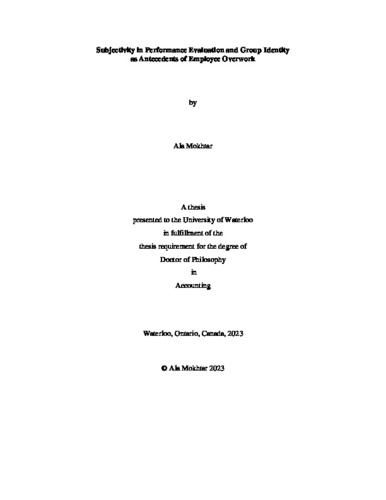UWSpace will be migrating to a new version of its software from July 29th to August 1st. UWSpace will be offline for all UW community members during this time.
Subjectivity in Performance Evaluation and Group Identity as Antecedents of Employee Overwork
| dc.contributor.author | Mokhtar, Ala | |
| dc.date.accessioned | 2023-08-18 18:20:28 (GMT) | |
| dc.date.available | 2023-08-18 18:20:28 (GMT) | |
| dc.date.issued | 2023-08-18 | |
| dc.date.submitted | 2023-08-01 | |
| dc.identifier.uri | http://hdl.handle.net/10012/19717 | |
| dc.description.abstract | Employees often overwork by working longer than contractual or statutory standard working time for no immediate additional monetary gain. Despite the prevalence of overwork in firms, little is understood about why employees choose to work such long hours. Firms often have high overwork levels despite management encouraging employees to make use of work-life balance policies, and employees at such firms often believe that their long work hours are self-imposed. Employees likely would not feel that way if they are given explicit management directives to work long hours, indicating that other factors in the organization lead employees to overwork. I use an experiment to investigate how two key features of a firm’s management control system – the subjectivity in performance evaluation and the strength of employees’ identity with their colleagues (hereafter, group identity) – affect employees’ level of overwork. I find that the effect of subjectivity in performance evaluation on the level of overwork is increasing in group identity strength, such that a positive effect is present only when group identity is stronger and not when it is weaker. I also find that group identity has a significant positive effect on the level of overwork at higher but not lower levels of subjectivity in performance evaluation. These results largely support my hypotheses. Finally, I employ a secondary experiment and provide evidence that subjectivity in performance evaluation impacts the level of overwork primarily through the effort heuristic mechanism. My study is important because understanding factors within firms that propagate overwork is consequential for firms that want to discourage such overwork due to its negative consequences. Understanding these factors also allows firms to have a more complete understanding of what motivates their employees. | en |
| dc.language.iso | en | en |
| dc.publisher | University of Waterloo | en |
| dc.subject | effort heuristic | en |
| dc.subject | group identity | en |
| dc.subject | overwork | en |
| dc.subject | social comparison | en |
| dc.subject | subjective performance evaluation | en |
| dc.title | Subjectivity in Performance Evaluation and Group Identity as Antecedents of Employee Overwork | en |
| dc.type | Doctoral Thesis | en |
| dc.pending | false | |
| uws-etd.degree.department | School of Accounting and Finance | en |
| uws-etd.degree.discipline | Accounting | en |
| uws-etd.degree.grantor | University of Waterloo | en |
| uws-etd.degree | Doctor of Philosophy | en |
| uws-etd.embargo.terms | 0 | en |
| uws.contributor.advisor | Bauer, Tim | |
| uws.contributor.advisor | Presslee, Adam | |
| uws.contributor.affiliation1 | Faculty of Arts | en |
| uws.published.city | Waterloo | en |
| uws.published.country | Canada | en |
| uws.published.province | Ontario | en |
| uws.typeOfResource | Text | en |
| uws.peerReviewStatus | Unreviewed | en |
| uws.scholarLevel | Graduate | en |

